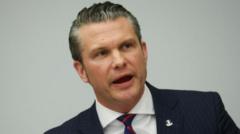Hegseth's remarks come during an international meeting in Brussels, marking a pivotal moment in discussions about military and diplomatic strategies concerning the war in Ukraine.
**Hegseth Claims Return to Pre-2014 Borders for Ukraine is Not Feasible**

**Hegseth Claims Return to Pre-2014 Borders for Ukraine is Not Feasible**
U.S. Defense Secretary Pete Hegseth asserts that the expectation for Ukraine to reacquire its pre-2014 borders is "unrealistic," signaling a potential shift in U.S. policy on the ongoing conflict.
In a significant address at the Ukraine Defence Contact Group meeting in Brussels, U.S. Defense Secretary Pete Hegseth characterized the notion of Ukraine returning to its pre-2014 borders as “unrealistic.” This statement highlights the complexities surrounding the ongoing conflict with Russia, particularly after the annexation of Crimea and Moscow's support for separatists in Eastern Ukraine.
Hegseth emphasized that achieving a "durable peace" necessitates a sober evaluation of the battlefield dynamics. He indicated that the U.S. does not foresee Ukraine's NATO membership as a viable goal in any future negotiations, reducing Kyiv’s earlier aspirations for a stronger military alliance with the West.
Discussing the importance of security agreements, Hegseth stated that any enduring peace must be backed by solid security assurances but clarified that U.S. troops will not be deployed to Ukraine, implying that any peacekeeping forces should operate outside NATO's purview. His remarks provide insight into the Trump administration's stance on the war and its diplomatic aspirations.
Analysts expect these comments might provoke a mixed reaction in Ukraine, where there has been unwavering support for NATO membership and resistance to territorial concessions. Hegseth acknowledged Russia’s ongoing control over nearly 20% of Ukrainian territory, predominantly in the eastern and southern regions.
Hegseth further called on NATO European members to shoulder more responsibility for aiding Ukraine, reiterating a sentiment of the U.S. reducing direct involvement. He articulated the need for a balanced contribution, urging European allies to lead in providing equipment and support.
The U.S. has been a major arms supplier to Ukraine, but Trump's statements have raised concerns about how that relationship may evolve. Meanwhile, Ukrainian President Volodymyr Zelensky indicated a readiness to discuss peace, proposing a potential land exchange with Russia. However, concerns linger over whether a diplomatic resolution will be achievable, considering the high stakes involved.
In a time when peace discussions rise in urgency, Hegseth's remarks represent a pivotal moment in understanding the potential future of Ukraine’s geopolitical landscape and its relationship with both NATO and the U.S.






















